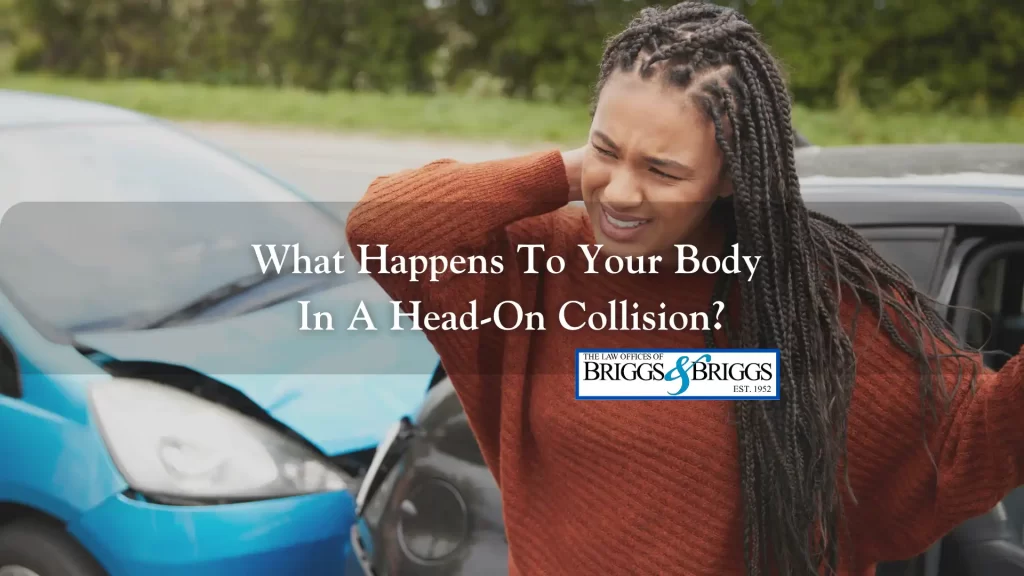Posted on Saturday, April 1st, 2023 at 9:00 am

A head-on collision subjects the body to a sudden and violent deceleration due to the force generated by the impact. The impact can cause various injuries, including whiplash, concussion, broken bones, internal bleeding, and organ damage. The severity of these injuries depends on multiple factors, such as the speed and weight of the vehicles involved and the use of safety equipment like seat belts and airbags.
Even with safety equipment, a head-on collision can still result in serious injuries or death. Survivors of a head-on collision may also experience psychological effects, such as post-traumatic stress disorder. Therefore, it is essential to take all possible precautions to avoid head-on collisions and ensure appropriate safety measures are in place to minimize the risk of injury during a crash.
What Are Common Injuries from a Head-On Collision?
The impact of a head-on collision can cause significant damage to the human body. The force generated by the crash can throw the body forward and then suddenly stop it. This sudden stop can expose the body to extreme forces, leading to various injuries.
One of the most common injuries in a head-on collision is whiplash. Whiplash occurs when the neck is suddenly forced forward and then backward, causing damage to the muscles, ligaments, and tendons in the neck. This type of injury can cause pain, stiffness, and reduced mobility in the neck and can take several weeks or even months to heal.
Another common injury in a head-on collision is a concussion or traumatic brain injury. When the head takes a sudden impact, the brain moves, often bouncing off the front and back of the skull. This movement can cause the brain to bruise or swell, leading to headaches, dizziness, confusion, and memory loss. A concussion or traumatic brain injury can lead to long-term brain damage in severe cases.
In addition to whiplash, concussion, and traumatic brain injury, a head-on collision can cause facial lacerations, dental fractures, broken bones, internal bleeding, and organ damage. If the vehicles travel at great speeds, the injuries will be more severe and could include life-changing complications, such as paralysis and brain damage. Head-on collisions can also result in death.
Can Safety Measures Reduce the Risk of Injury in a Head-On Collision?
Seat belts and airbags can significantly reduce the risk of injury in a head-on collision. Seat belts help keep the body restrained during a crash, reducing the risk of throwing the body around inside the vehicle or through a window. Airbags provide an additional layer of protection, absorbing some of the force generated by the collision and reducing the risk of head and neck injuries.
However, a head-on collision can still cause serious injuries or even death despite using safety equipment. In some cases, the force of the crash can cause the vehicle to crumple or even be crushed, trapping the occupants inside. In these cases, emergency services must use specialized equipment to extract the occupants from the car, often resulting in a lengthy and complex rescue operation.
In addition to physical injuries, a head-on collision can have psychological effects. Survivors of a head-on collision may experience post-traumatic stress disorder (PTSD), characterized by symptoms such as anxiety, depression, and flashbacks. PTSD can significantly impact a person’s quality of life and require treatment to manage the symptoms.
How Can an Attorney Help Me?
 If you have been in a head-on collision, an attorney can help you in several ways, such as:
If you have been in a head-on collision, an attorney can help you in several ways, such as:
- Legal representation – An attorney can provide legal representation and guide you through the legal process. They can help you understand your rights and options.
- Investigation – An attorney can investigate the accident to determine who was at fault. They can gather evidence, interview witnesses, and consult with experts to build a strong case on your behalf.
- Assess the value of your claim – Your attorney can calculate the true cost of all your accident-related injuries and losses, including considering lost future income or earning capacity and potential future medical expenses.
- Negotiation – An attorney can negotiate with insurance companies or the other side for the fair compensation you deserve.
- Court representation – If your case goes to court, an attorney can represent and advocate for your interests.
Contact Our Personal Injury Attorneys Today
If you’ve been in a car accident, contact the Lakewood car accident attorneys of The Law Offices of Briggs & Briggs today for help. Our team of seasoned attorneys can work to get the compensation you deserve and protect your rights after a head-on collision. We can help you regain peace of mind and help you move forward after that traumatic event. Call us today at (253) 588-6696 or contact us online.
Related Posts
4 Ways To Prevent Car Accidents
Five Tips For Safe Travel During The Holidays
What Jurors Aren’t Told In Car Accident Cases
